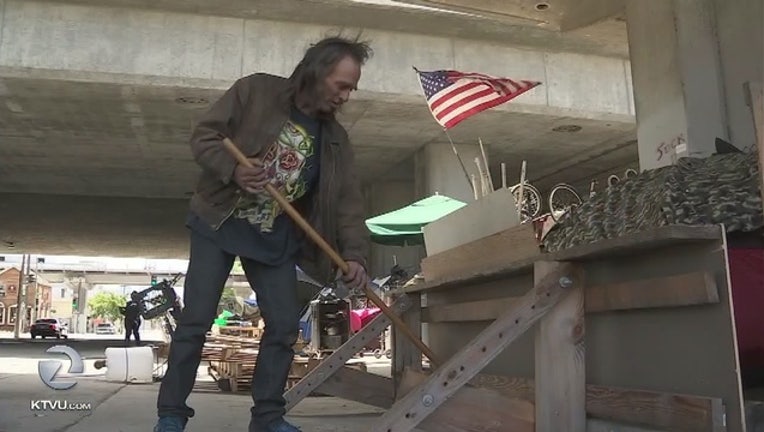San Francisco judge declines to block eviction of homeless camp near Berkeley BART tracks

SAN FRANCISCO (BCN) - A federal judge in San Francisco today turned down a bid by five residents of a homeless camp near BART tracks in South Berkeley for a preliminary injunction blocking their eviction by the transit agency.
U.S. District Judge William Alsup said he sympathized with the camp members' situation, but said "court approval to settle indefinitely on the land of a municipal transportation district would be unprecedented."
"While sympathetic to the plight of plaintiffs, and the problem of homelessness, which is ever more severe, the court must be faithful to the law," Alsup wrote in a 10-page ruling.
"The sad fact is that plaintiffs cannot meet the standard required for the drastic relief sought," the judge wrote.
The camp, sometimes known as "Here/There," is located on land owned by BART on the west side of BART tracks near the Oakland border.
A fluctuating number of 20 to 30 people who call their group "First They Came for the Homeless" has lived there since January, after having been evicted from several other sites on city land since 2015. Group members say the camp prohibits hard drugs, alcohol and violence.
BART contends the group is trespassing. It says it is concerned about sanitation, health and safety and has received complaints from neighbors and parents at a nearby school.
Alsup's ruling this afternoon followed an hour-long hearing this morning on a federal civil rights lawsuit filed by the residents the day after BART posted a 72-hour eviction notice on Oct. 21.
On Oct. 24, Alsup temporarily suspended the eviction by issuing a temporary restraining order that remained in effect until today's order denying a longer-term preliminary injunction.
Today's ruling allows BART to go ahead with the eviction, but Alsup said the agency must post a new 72-hour notice.
The group's lawyer, Dan Siegel, said, "I'm disappointed but not particularly surprised."
Siegel said he doesn't expect to appeal the decision. He said that it is up to BART to post a new notice, but then, "I think if people do not leave they will be evicted."
But Siegel said that even if evicted, the group will go ahead with pursuing a full trial on its lawsuit, expected early next year.
"It's a good case," he said.
Alsup said in his order that evidence gathering for a trial could begin.
BART spokesman James Allison said, "We will continue to work with the courts and the community to resolve this complex issue."
He said agency officials are hopeful the encampment will comply with the notice to vacate the property.
The plaintiffs claimed violations of three constitutional rights. Alsup rejected all three arguments.
He said the planned eviction wasn't an unconstitutional cruel and unusual punishment because it would not amount to a criminalization of the occupants' homeless status. Instead, BART's action invoked the almost universally recognized doctrine of trespass, Alsup said.
"In the absence of such protection, anyone would be free to live on any property," the judge wrote.
Alsup also said the eviction would not violate the rights of due process and freedom from unreasonable seizures because BART planned to post a 72-hour notice and to keep any property left on the site for 14 to 90 days so that the residents would have a chance to retrieve it.

